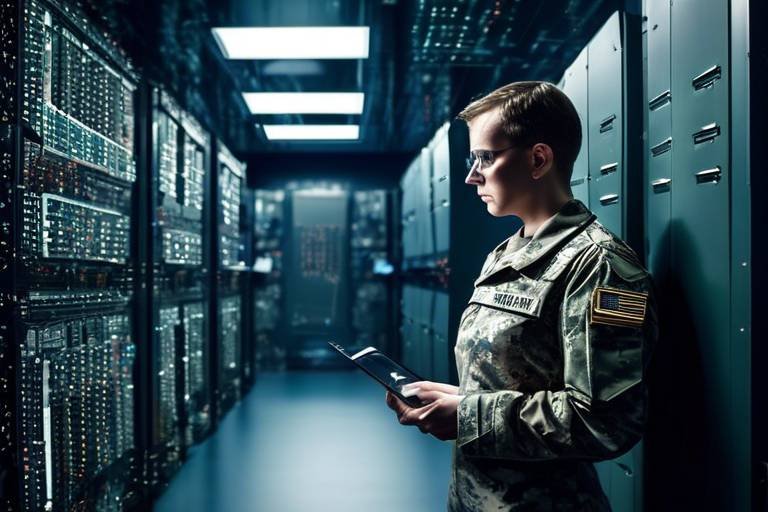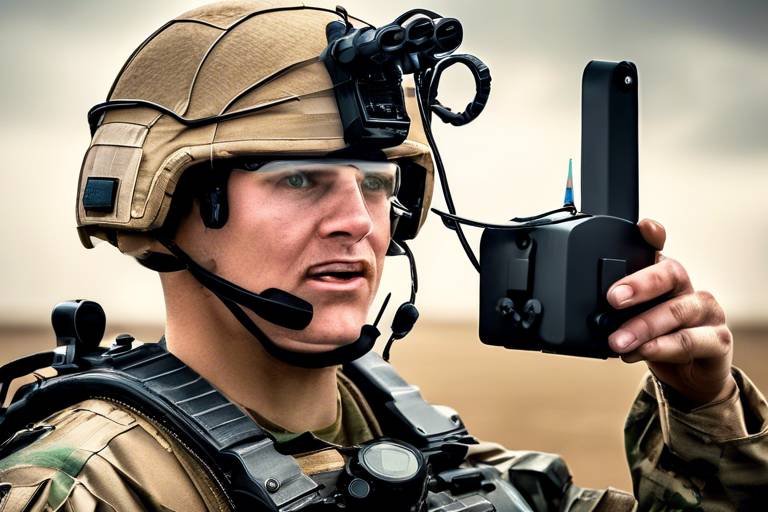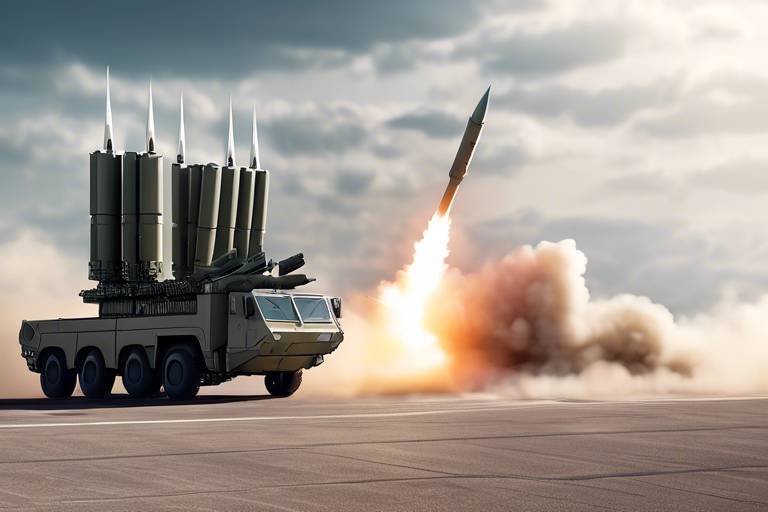AI-Enhanced Defense Systems - Challenges and Opportunities
The integration of artificial intelligence (AI) into defense systems represents a groundbreaking shift in how nations approach national security and military operations. Imagine a world where machines can analyze vast amounts of data faster than any human, making split-second decisions that could determine the outcome of conflicts. The potential for enhanced military efficiency and effectiveness is enormous, but this transformation doesn't come without its own set of challenges. In this article, we will explore the dual nature of AI in defense—its opportunities for innovation and the hurdles that must be overcome to ensure its responsible use.
At the heart of the discussion is the understanding that AI can significantly improve decision-making processes, streamline surveillance, and refine combat strategies. However, as we dive deeper into AI's role, it becomes clear that the technology poses ethical dilemmas and operational risks that cannot be ignored. The balance between harnessing AI's potential and mitigating its risks is a tightrope walk that defense organizations must navigate with care.
As we embark on this exploration, it's essential to recognize that while AI offers unprecedented opportunities, it also raises critical questions about accountability, data privacy, and the moral implications of machine-led warfare. Are we ready to entrust machines with life-and-death decisions? How do we ensure that AI systems are free from bias and operate within the bounds of international law? These are just a few of the pressing issues we will address as we uncover the layers of AI-enhanced defense systems.
To grasp the full impact of AI on defense, we must first understand its fundamental concepts. AI in this context refers to the simulation of human intelligence processes by machines, particularly computer systems. This includes learning (the acquisition of information and rules for using it), reasoning (using rules to reach approximate or definite conclusions), and self-correction. In defense, these capabilities can be applied to enhance surveillance systems, improve logistics, and even support troops in combat situations.
AI is already making waves in military operations, with applications ranging from autonomous drones to predictive maintenance systems. For instance, autonomous drones can conduct surveillance missions without human intervention, providing real-time data to commanders. Predictive maintenance uses AI algorithms to analyze equipment data, predicting failures before they occur, thereby saving costs and increasing operational readiness. Additionally, battlefield simulations powered by AI offer military strategists the ability to test various scenarios and outcomes, ensuring that troops are better prepared for real-world engagements.
The rise of autonomous weapons systems has ignited a fierce debate about their operational capabilities and ethical implications. These systems can operate independently of human control, leading to questions about accountability in warfare. If an autonomous drone makes a mistake, who is responsible? The manufacturer, the military, or the machine itself? This section will delve into these operational capabilities, the ongoing debates, and the pressing need for clear regulatory frameworks.
As the deployment of autonomous weapons systems becomes more prevalent, the establishment of regulatory frameworks is crucial. These frameworks must ensure compliance with international laws and uphold ethical standards. The challenge lies in creating regulations that are flexible enough to adapt to rapid technological advancements while still providing robust oversight.
With the deployment of autonomous weapons comes a host of potential risks. These include unintended engagements, where machines may misinterpret data and take lethal action against non-combatants. Furthermore, the issue of accountability remains a significant concern. As machines make more decisions, determining who is responsible for errors becomes increasingly complex, potentially escalating conflicts instead of resolving them.
AI also plays a pivotal role in enhancing cybersecurity measures within defense systems. With the rise of cyber threats, AI can significantly improve threat detection and response strategies. By analyzing patterns and anomalies in data, AI systems can identify potential breaches before they escalate, protecting sensitive information and ensuring operational integrity.
Despite the promising prospects of AI in defense, several challenges hinder its integration. Technical limitations, data privacy concerns, and the pressing need for skilled personnel are just a few of the hurdles that defense organizations face. Addressing these challenges is essential for successfully harnessing AI's potential.
One of the critical factors in the successful implementation of AI is the quality and availability of data. High-quality data is essential for training AI algorithms, but collecting, storing, and managing this data in defense contexts presents significant challenges. Ensuring that data is accurate, relevant, and secure is vital for effective AI operations.
The ethical dilemmas posed by AI in defense are profound. Issues of bias in AI algorithms can lead to unfair treatment of individuals or groups, while the question of accountability in machine decision-making raises moral concerns. As we move forward, addressing these ethical considerations will be crucial for building trust in AI systems.
Looking ahead, the future of AI in defense systems is filled with opportunities. Advancements in technology, international collaborations, and innovations on the horizon promise to revolutionize military operations. By embracing these opportunities, defense organizations can enhance their operational effectiveness and security.
International collaborations can significantly enhance AI capabilities in defense. By promoting shared knowledge, resources, and joint operational strategies, nations can work together to address common threats and improve overall security. This collaborative approach not only strengthens individual nations but also fosters global stability.
Emerging technologies, such as quantum computing and advanced machine learning techniques, hold the potential to further revolutionize AI applications in defense. These innovations could lead to faster processing times, improved decision-making capabilities, and more sophisticated threat detection systems, paving the way for a new era in military operations.
- What are autonomous weapons systems? Autonomous weapons systems are military systems that can operate independently of human control, making decisions based on AI algorithms.
- What are the ethical concerns surrounding AI in defense? Ethical concerns include issues of bias, accountability, and the moral implications of machine decision-making in warfare.
- How does AI enhance cybersecurity in defense? AI enhances cybersecurity by improving threat detection and response strategies, helping to protect sensitive information from cyber threats.
- What challenges does AI face in defense integration? Challenges include technical limitations, data privacy concerns, and the need for skilled personnel to manage and operate AI systems effectively.

Understanding AI in Defense
Artificial Intelligence (AI) is rapidly transforming the landscape of defense systems, ushering in a new era of military capabilities that were once the stuff of science fiction. Imagine a battlefield where decisions are made in the blink of an eye, where drones can autonomously navigate hostile environments, and where predictive algorithms can foresee threats before they even materialize. This is not just a dream; it's the reality we are stepping into. At its core, AI enhances the decision-making process, providing military leaders with real-time data analysis and actionable insights that can significantly improve operational efficiency.
AI plays several crucial roles in defense, each contributing to a more robust national security framework. For instance, in surveillance, AI algorithms can sift through vast amounts of data from satellites and reconnaissance missions, identifying potential threats with remarkable accuracy. This level of efficiency allows for quicker responses and more informed decisions. Similarly, in combat strategies, AI can analyze historical data and simulate various scenarios, helping commanders devise tactics that are more likely to succeed. It’s akin to having a chess master who can anticipate several moves ahead, giving a strategic advantage in real-time situations.
Moreover, AI's integration into defense systems is not just about enhancing existing capabilities; it also opens the door to innovative applications. For example, AI can facilitate predictive maintenance, ensuring that military equipment is always in optimal condition. By analyzing usage patterns and wear-and-tear data, AI can predict when a piece of equipment is likely to fail, allowing for timely repairs and reducing the risk of malfunction during critical operations. This proactive approach not only saves costs but also enhances mission readiness.
However, it’s essential to recognize that the integration of AI into defense systems is not without its challenges. The complexities of AI technology necessitate a deep understanding of its implications. For instance, while AI can improve efficiency, it also raises questions about accountability and ethics. Who is responsible if an autonomous system makes a mistake? These are the kinds of questions that military leaders and policymakers must grapple with as they navigate this evolving landscape.
Furthermore, the role of AI in defense is still evolving, and as it matures, we can expect to see even more sophisticated applications emerge. From enhanced cybersecurity measures that protect sensitive information to advanced simulation technologies that prepare troops for various scenarios, the potential is vast. As we continue to explore these opportunities, it’s crucial to maintain a balanced perspective on both the benefits and the challenges that AI presents.
- What are the primary benefits of using AI in defense?
AI enhances decision-making, improves surveillance capabilities, and facilitates predictive maintenance, ultimately leading to improved operational efficiency. - What ethical concerns arise from the use of AI in military applications?
Key ethical concerns include accountability for autonomous actions, potential biases in decision-making algorithms, and the moral implications of machine-led warfare. - How does AI improve cybersecurity in defense?
AI enhances cybersecurity by enabling faster threat detection, automating response strategies, and protecting sensitive information from cyber attacks.

Current Applications of AI in Military
The integration of artificial intelligence (AI) into military operations is revolutionizing the way armed forces conduct their missions. From enhancing decision-making processes to automating complex tasks, AI is becoming an indispensable tool on the battlefield. One of the most notable applications of AI in the military is the deployment of autonomous drones. These unmanned aerial vehicles (UAVs) can carry out surveillance, reconnaissance, and even combat missions without direct human intervention. Imagine a fleet of drones flying in formation, gathering real-time intelligence while minimizing the risk to human lives. This capability not only increases operational efficiency but also provides a strategic advantage in modern warfare.
Another significant application of AI is in predictive maintenance. Military equipment, from tanks to aircraft, requires constant upkeep to ensure optimal performance. AI algorithms analyze vast amounts of data from sensors embedded in the machinery, predicting when a component is likely to fail. This proactive approach allows for timely maintenance, reducing downtime and saving costs. It's akin to having a personal mechanic who knows your vehicle inside out, ensuring it runs smoothly at all times.
Moreover, AI is playing a crucial role in battlefield simulations. These simulations utilize AI to create realistic training environments where military personnel can practice their strategies without the risks associated with live exercises. By simulating various combat scenarios, soldiers can hone their skills, make mistakes, and learn from them in a safe setting. This not only prepares them for real-world challenges but also enhances their ability to adapt to rapidly changing situations.
In addition to these applications, AI is also being utilized in intelligence analysis. Military analysts are inundated with data from various sources, including satellite imagery, social media, and intercepted communications. AI systems can sift through this information, identifying patterns and anomalies that human analysts might overlook. This capability is critical for timely decision-making, especially in situations where every second counts. It's like having a supercharged assistant who can process information at lightning speed, providing actionable insights that can turn the tide of a conflict.
However, the implementation of AI in military operations is not without its challenges. As we explore the potential of AI technologies, we must also consider the ethical implications and the need for robust regulatory frameworks to ensure responsible use. The balance between leveraging advanced technologies and maintaining accountability will be essential in shaping the future of military operations.
- What are autonomous drones, and how are they used in the military?
Autonomous drones are unmanned aerial vehicles that can operate without direct human control. They are used for surveillance, reconnaissance, and combat missions, significantly enhancing operational capabilities while reducing risks to personnel. - How does AI contribute to predictive maintenance in military equipment?
AI analyzes data from sensors in military equipment to predict when parts may fail, allowing for timely maintenance and reducing downtime. - What role do battlefield simulations play in military training?
AI-powered battlefield simulations create realistic training environments for soldiers, enabling them to practice strategies and improve their skills without the risks associated with live exercises. - How does AI assist in intelligence analysis?
AI systems can process large amounts of data from various sources, identifying patterns and anomalies that aid military analysts in making informed decisions quickly.

Autonomous Weapons Systems
The emergence of has sparked significant debate and concern within both military circles and the general public. These systems, capable of operating without direct human intervention, present a paradigm shift in how warfare is conducted. Imagine a battlefield where drones make split-second decisions, targeting threats with pinpoint accuracy, all while reducing the risk to human soldiers. Sounds impressive, right? But with great power comes great responsibility, and the ethical implications are as complex as the technology itself.
At their core, autonomous weapons systems utilize advanced artificial intelligence algorithms to analyze data, make decisions, and execute actions. This technology can enhance operational efficiency and effectiveness, allowing military forces to respond to threats more rapidly than ever before. For example, an autonomous drone can scan a large area for potential enemy movements and engage targets with minimal human oversight. However, the very idea of machines making life-and-death decisions raises profound ethical questions. Who is accountable if an autonomous system mistakenly targets civilians? What happens when these systems are hacked or malfunction? These are not just hypothetical scenarios; they are real concerns that demand our attention.
Moreover, the rise of autonomous weapons systems necessitates a comprehensive understanding of their operational capabilities. These systems can be classified into various categories based on their level of autonomy:
| Type | Description |
|---|---|
| Fully Autonomous | Operates independently without human intervention. |
| Human-in-the-Loop | Requires human approval before taking action. |
| Human-on-the-Loop | Monitors actions but can intervene if necessary. |
As we delve deeper into the implications of these systems, it becomes clear that a robust regulatory framework is essential. The international community must establish guidelines to govern the development and deployment of autonomous weapons, ensuring that they comply with existing laws and ethical standards. This is not merely about creating rules; it’s about fostering a culture of responsibility and accountability in military operations.
In addition to regulatory concerns, we must also analyze the potential risks associated with autonomous weapons systems. One significant risk is the possibility of unintended engagements, where a system could misidentify a target and cause collateral damage. Furthermore, accountability issues arise when machines make decisions that lead to disastrous outcomes. Who is to blame—the programmer, the military leader, or the machine itself? These questions highlight the urgent need for a clear framework that delineates responsibility and accountability in the use of autonomous systems.
In conclusion, while autonomous weapons systems hold the potential to revolutionize modern warfare, they also bring forth a myriad of challenges that must be carefully navigated. The balance between leveraging advanced technology for military advantage and ensuring ethical accountability is delicate, and it is a conversation that we must continue to engage in as these systems evolve.
- What are autonomous weapons systems? Autonomous weapons systems are military technologies that can operate without direct human control, making decisions based on AI algorithms.
- What are the ethical concerns associated with these systems? Ethical concerns include accountability for mistakes, potential targeting of civilians, and the moral implications of machines making life-and-death decisions.
- How do we regulate autonomous weapons? Establishing a regulatory framework involves creating international guidelines that ensure compliance with laws and ethical standards in the development and use of these systems.
- What are the operational capabilities of these systems? They can be fully autonomous, human-in-the-loop, or human-on-the-loop, each with varying levels of human oversight.

Regulatory Frameworks
The integration of artificial intelligence in defense systems brings with it a myriad of challenges, particularly when it comes to establishing . As nations around the world race to develop and deploy AI technologies in military applications, the need for comprehensive regulations becomes increasingly critical. These frameworks are essential to ensure that the use of AI in defense not only adheres to international laws but also aligns with ethical standards that govern warfare. But what exactly should these regulations encompass?
First and foremost, regulatory frameworks must address the development and deployment of autonomous weapons systems. These systems, capable of making life-and-death decisions without human intervention, pose unique challenges. For instance, there is a pressing need for guidelines that dictate how these systems should operate in combat scenarios, ensuring that they can distinguish between combatants and non-combatants. Without such regulations, the potential for unintended engagements increases significantly, raising serious ethical questions about accountability and responsibility.
Moreover, international cooperation is vital in crafting these frameworks. The global nature of warfare today means that a unilateral approach to regulation could create significant gaps in accountability. Countries must come together to establish international treaties that govern the use of AI in military contexts. This collaboration could take the form of conferences, joint research initiatives, and the sharing of best practices. Such efforts would not only enhance the safety and effectiveness of AI deployments but also foster trust among nations.
Another key aspect of regulatory frameworks is the transparency of AI algorithms. As these technologies become more complex, understanding their decision-making processes becomes a challenge. Regulations should mandate that military AI systems are subject to rigorous testing and evaluation, ensuring that they operate within defined parameters and can be audited when necessary. This transparency is crucial for maintaining public trust and ensuring compliance with ethical standards.
Additionally, regulatory frameworks must consider the implications of data privacy and security. With AI systems relying heavily on vast amounts of data, the protection of sensitive information becomes paramount. Regulations should outline how data is collected, stored, and used, ensuring that personal and classified information is safeguarded against unauthorized access and exploitation.
In conclusion, while the opportunities presented by AI in defense are vast, the establishment of robust regulatory frameworks is essential to mitigate potential risks. These frameworks should encompass guidelines for the development and deployment of autonomous systems, promote international cooperation, ensure transparency in AI operations, and protect data privacy. By addressing these critical areas, nations can harness the power of AI while upholding ethical standards and maintaining global security.
- What are regulatory frameworks in the context of AI in defense?
Regulatory frameworks refer to the set of guidelines and laws that govern the development, deployment, and use of artificial intelligence technologies in military applications. - Why is international cooperation important for regulatory frameworks?
International cooperation is crucial because warfare is a global issue, and unilateral regulations could create gaps in accountability and safety. - How can transparency in AI algorithms be ensured?
Regulations should mandate rigorous testing and evaluation of AI systems, ensuring that their decision-making processes are understandable and auditable. - What role does data privacy play in AI defense regulations?
Data privacy is vital as AI systems require large amounts of data, and regulations should protect sensitive information from unauthorized access.

Potential Risks
As we dive into the world of artificial intelligence (AI) in defense systems, it’s crucial to acknowledge the that come with this powerful technology. While AI can enhance military capabilities, it also introduces a range of challenges that can have serious implications for national security and global stability. One of the primary concerns is the risk of unintended engagements. Imagine a scenario where an autonomous weapon misinterprets a situation due to a flaw in its programming or data input. This could lead to catastrophic consequences, such as an accidental attack on civilian targets or friendly forces. The stakes are incredibly high, and the margin for error is slim.
Another significant issue is the accountability of AI systems in warfare. When a machine makes a decision to engage a target, who is responsible for that action? Is it the programmer, the military commander, or the machine itself? This ambiguity raises ethical questions that challenge traditional notions of accountability in military operations. As we rely more on these systems, we must grapple with the implications of delegating life-and-death decisions to algorithms.
Furthermore, the potential for escalation of conflicts cannot be overlooked. Autonomous systems can operate at speeds far beyond human reaction times. This means that once a conflict begins, AI systems could escalate the situation rapidly, making it difficult for human operators to intervene or de-escalate tensions. The fear is that these systems could trigger a chain reaction of responses that spiral out of control, leading to unintended warfare.
In addition to these operational risks, there are also concerns about the security of AI systems themselves. Cybersecurity threats could compromise the integrity of AI algorithms, leading to manipulated outcomes that could endanger military personnel and national security. If adversaries can gain access to or influence these systems, the implications could be dire, potentially turning our own technology against us.
To summarize, the integration of AI in defense systems presents several potential risks that must be carefully managed. These include:
- Unintended engagements due to misinterpretation of data.
- Accountability issues surrounding decisions made by autonomous systems.
- Escalation of conflicts driven by rapid AI decision-making.
- Cybersecurity vulnerabilities that could compromise military operations.
As we look to the future, it’s essential for policymakers, engineers, and military leaders to engage in discussions about these risks. Developing robust regulatory frameworks and ethical guidelines will be vital in ensuring that AI technologies are deployed responsibly and effectively in defense contexts.
- What are autonomous weapons systems?
Autonomous weapons systems are military systems that can operate without human intervention, making decisions to engage targets based on programmed algorithms. - How can AI improve military efficiency?
AI enhances military efficiency by automating tasks, improving data analysis, and enabling faster decision-making processes on the battlefield. - What ethical concerns are associated with AI in defense?
Ethical concerns include accountability for decisions made by AI, potential biases in algorithms, and the moral implications of using machines in warfare. - How can risks associated with AI in defense be mitigated?
Risks can be mitigated through the development of stringent regulatory frameworks, ongoing ethical discussions, and ensuring high-quality data is used in AI systems.

AI in Cybersecurity
In today's digital age, where threats lurk around every virtual corner, artificial intelligence (AI) has emerged as a game-changer in the realm of cybersecurity. Imagine having a vigilant guardian that never sleeps, tirelessly monitoring your digital assets for potential threats. That's the essence of AI in cybersecurity—it enhances our ability to detect, respond to, and mitigate cyber threats in real-time. With the increasing sophistication of cyber-attacks, the integration of AI technologies into defense systems has become not just beneficial but essential.
AI systems can analyze vast amounts of data at lightning speed, identifying patterns and anomalies that would take humans much longer to detect. This capability is particularly crucial in an era where data breaches and cyberattacks are becoming more frequent and complex. For instance, AI can help in identifying unusual network traffic, which could indicate a potential breach. By employing machine learning algorithms, AI systems can learn from past incidents, continuously improving their threat detection capabilities.
Moreover, AI can automate responses to certain types of threats. Imagine a scenario where a cyber-attack is detected; instead of waiting for human intervention, an AI system can initiate a predefined response protocol. This not only speeds up the reaction time but also minimizes damage. For example, if a phishing attempt is detected, AI can automatically isolate the affected system and alert the IT team, allowing them to address the issue before it escalates.
However, it's essential to understand that while AI enhances cybersecurity, it is not a silver bullet. Cybercriminals are also leveraging AI to develop more sophisticated attacks. This cat-and-mouse game means that defense systems must continually evolve. A proactive approach is necessary, where AI is used not just for defense but also for predicting potential threats based on emerging trends.
To illustrate the effectiveness of AI in cybersecurity, consider the following table that outlines some of the key applications:
| Application | Description |
|---|---|
| Threat Detection | AI analyzes network traffic to identify potential threats and anomalies. |
| Incident Response | Automated responses to detected threats, reducing reaction time. |
| Predictive Analysis | AI predicts potential vulnerabilities based on historical data. |
| Phishing Detection | AI identifies and blocks phishing attempts in real-time. |
Furthermore, the role of AI in cybersecurity extends beyond just threat detection. It also encompasses the protection of sensitive information. With AI's ability to encrypt data and monitor access, organizations can ensure that their most valuable assets remain secure from unauthorized access. This dual approach—detecting threats while simultaneously protecting sensitive data—highlights the comprehensive nature of AI's role in modern cybersecurity.
In conclusion, AI in cybersecurity is not just a trend; it's a necessity in our increasingly digital world. As cyber threats evolve, so too must our defenses. By harnessing the power of AI, organizations can not only enhance their security posture but also stay one step ahead of cybercriminals. The future of cybersecurity is bright, and AI is at the forefront of this revolution.
- How does AI improve threat detection?
AI improves threat detection by analyzing large volumes of data and identifying patterns that indicate potential cyber threats, enabling faster and more accurate responses. - Can AI completely replace human cybersecurity experts?
No, while AI enhances cybersecurity efforts, human expertise remains crucial for strategic decision-making and addressing complex security issues. - What are the limitations of AI in cybersecurity?
AI systems can be vulnerable to adversarial attacks, require high-quality data for training, and may struggle with understanding the context of certain threats. - How can organizations implement AI in their cybersecurity strategies?
Organizations can start by integrating AI-driven tools for threat detection and response, investing in training for their teams, and continuously updating their systems to adapt to new threats.

Challenges in AI Integration
Integrating artificial intelligence (AI) into defense systems is not just a walk in the park; it’s more like navigating a minefield. While the potential benefits are enormous, the challenges that come with AI integration are equally daunting. One of the most significant hurdles is the technical limitations of current AI technologies. These systems require robust algorithms and substantial computational power, which can be a challenge in the often resource-constrained environments of military operations. Imagine trying to fit a high-performance sports car engine into a vintage vehicle; while the engine might be superior, making it work with outdated infrastructure can be a nightmare.
Another major concern is data privacy. With AI systems relying heavily on data to function effectively, the collection and management of sensitive information become critical. The military deals with vast amounts of classified data, and mishandling this information can lead to severe consequences, including breaches of national security. Additionally, data privacy laws and ethical considerations can complicate the data collection process, creating a tangled web of regulations that must be navigated carefully.
Moreover, there is a pressing need for skilled personnel who can develop, implement, and maintain these advanced systems. The defense sector often competes with the private sector for top talent in AI and machine learning, making it challenging to recruit and retain skilled individuals. This shortage can lead to delays in project timelines and hinder the effective deployment of AI technologies. The gap in skills is akin to trying to build a complex machine without having all the necessary tools; without the right expertise, even the best technologies can falter.
Another critical aspect to consider is the quality and availability of data. AI thrives on high-quality data, yet the military often faces challenges in collecting, storing, and managing this data effectively. For instance, if the data fed into AI algorithms is biased or incomplete, the outcomes can be skewed, leading to poor decision-making in high-stakes situations. This is especially concerning in defense, where the margin for error is razor-thin. Imagine a pilot relying on faulty data during a mission; the consequences could be catastrophic.
Finally, we cannot overlook the ethical considerations that come into play with AI in defense. The deployment of AI systems raises profound questions about accountability and bias. Who is responsible when an autonomous system makes a decision that leads to unintended consequences? Moreover, the potential for AI to perpetuate existing biases in data can lead to unfair outcomes, which is a moral dilemma that the military must address. It’s like giving a loaded weapon to someone without training; the risks are far too great.
- What are the main challenges in integrating AI into defense systems?
The main challenges include technical limitations, data privacy concerns, the need for skilled personnel, data quality issues, and ethical considerations. - Why is data quality important for AI in defense?
High-quality data is crucial for AI algorithms because biased or incomplete data can lead to poor decision-making, especially in high-stakes military operations. - What ethical dilemmas does AI pose in military applications?
Ethical dilemmas include accountability for decisions made by autonomous systems and the potential for biased outcomes due to flawed data.

Data Quality and Availability
When it comes to the integration of artificial intelligence in defense systems, one of the most critical factors is the quality and availability of data. Think of data as the fuel that powers AI algorithms. Just like a high-performance car needs premium fuel to run efficiently, AI systems require high-quality data to function optimally. If the data is flawed or incomplete, the decisions made by AI can be misguided, leading to potentially catastrophic outcomes in military operations.
In the defense sector, data comes from various sources, including surveillance systems, reconnaissance missions, and battlefield reports. However, the challenge lies in ensuring that this data is not only accurate but also timely. For instance, imagine a situation where outdated or incorrect data is fed into an AI system responsible for making real-time decisions during combat. The consequences could be dire, affecting not just military personnel but also innocent civilians caught in the crossfire.
Moreover, data availability is another pressing issue. Many defense organizations struggle with data silos, where information is trapped within specific units or systems, making it difficult to access and analyze. This lack of interoperability can hinder the effectiveness of AI applications. To illustrate, consider a scenario where one branch of the military has critical intelligence about enemy movements, but this information is not shared with another unit that is about to engage in combat. The result? A missed opportunity that could have turned the tide of battle.
To tackle these challenges, defense organizations must prioritize the following:
- Data Collection: Implementing robust systems for gathering high-quality data from diverse sources.
- Data Management: Establishing protocols for storing, organizing, and retrieving data efficiently.
- Data Sharing: Promoting a culture of collaboration where data is shared across different units and branches of the military.
- Data Analysis: Utilizing advanced analytics to derive actionable insights from the data collected.
Furthermore, regular audits of data quality should be conducted to identify and rectify any discrepancies. This proactive approach can help ensure that AI systems are operating on the best possible information. Just as a chef would taste their dish before serving it to guests, military leaders must verify the integrity of their data before relying on AI for critical decisions.
In conclusion, the effectiveness of AI in defense systems hinges significantly on data quality and availability. By addressing these challenges head-on, military organizations can unlock the full potential of AI technologies, leading to enhanced operational effectiveness and improved national security.
- What are the main challenges related to data quality in defense? The main challenges include data accuracy, completeness, timeliness, and the presence of data silos that hinder accessibility.
- How can defense organizations improve data availability? By implementing robust data management systems, fostering a culture of collaboration, and ensuring interoperability between different units.
- Why is data important for AI in defense? Data serves as the foundation for AI algorithms, influencing decision-making processes and operational outcomes.

Ethical Considerations
As we stand on the brink of a technological revolution with the integration of artificial intelligence (AI) into defense systems, a myriad of come to the forefront. The potential for AI to make decisions in life-and-death situations raises profound questions about accountability, bias, and the moral implications of machine-driven warfare. Imagine a world where a robot decides whether to engage a target without human intervention; it’s both fascinating and frightening.
One of the most pressing ethical dilemmas is the issue of accountability. When an autonomous weapon system makes a mistake—perhaps it misidentifies a civilian as a combatant—who is held responsible? Is it the programmer who wrote the code, the military personnel who deployed it, or the machine itself? This ambiguity complicates the legal landscape and poses significant challenges for international law. As we navigate these murky waters, it’s crucial to establish clear guidelines that delineate responsibility and accountability.
Another critical aspect to consider is bias. AI systems learn from data, and if that data is flawed or biased, the outcomes can be disastrous. For instance, if an AI is trained on historical military data that reflects biased decision-making, it may perpetuate those biases in future operations. This raises the question: how do we ensure that the data used to train these systems is representative and fair? Continuous monitoring and auditing of AI algorithms are essential to mitigate these risks.
Moreover, the concept of moral agency comes into play. Can machines truly understand the gravity of their decisions? While AI can analyze vast amounts of data and make calculations faster than any human, it lacks the emotional intelligence and moral reasoning that guide human decision-making. This disparity is a significant concern when considering the deployment of AI in combat scenarios. It’s vital to maintain human oversight in critical decisions to ensure that ethical standards are upheld.
To further illustrate these ethical concerns, let’s look at some key areas of focus:
- Decision-making in warfare: Should machines have the authority to make life-and-death decisions?
- Transparency: How can we ensure that AI systems operate transparently and that their decision-making processes are understandable?
- International norms: What global standards should govern the use of AI in military applications to prevent misuse?
In conclusion, while the integration of AI in defense systems presents remarkable opportunities for enhancing military efficiency, it also comes with significant ethical challenges. Addressing these issues requires a collaborative effort among technologists, ethicists, legal experts, and military leaders. Only by engaging in open dialogue and establishing robust ethical frameworks can we harness the power of AI responsibly and effectively.
- What are the main ethical concerns regarding AI in defense? The primary concerns include accountability, bias in decision-making, and the lack of moral reasoning in machines.
- How can we ensure accountability for AI decisions in military operations? Establishing clear guidelines and legal frameworks is essential to determine responsibility for autonomous actions.
- What role does data quality play in the ethical use of AI? High-quality, unbiased data is crucial for training AI systems to ensure fair and accurate decision-making.
- Can AI systems replace human oversight in military decisions? While AI can assist in decision-making, human oversight remains vital to uphold ethical standards and moral judgment.

Future Opportunities
As we gaze into the crystal ball of military innovation, the integration of artificial intelligence (AI) in defense systems presents a landscape ripe with possibilities. Imagine a world where AI not only enhances operational effectiveness but also fosters international collaborations that redefine how nations approach security. The future holds the promise of AI-driven advancements that could revolutionize military strategies, improve decision-making processes, and ultimately safeguard national interests more effectively than ever before.
One of the most exciting prospects is the potential for collaborative defense initiatives. Countries around the globe are beginning to recognize that security is a shared responsibility. By pooling resources and knowledge, nations can leverage AI technologies to develop more sophisticated defense mechanisms. This collaborative approach could lead to the creation of a global defense network that enhances situational awareness, improves threat detection, and facilitates real-time information sharing. Imagine a scenario where allied nations can seamlessly integrate their AI systems, creating a unified front against emerging threats. The synergy of shared intelligence could be a game-changer in how we confront global security challenges.
Moreover, the horizon is dotted with innovations that promise to push the boundaries of AI applications in defense. Emerging technologies such as quantum computing and advanced machine learning techniques are on the brink of transforming military operations. Quantum computing, with its unparalleled processing power, could enable AI systems to analyze vast datasets at lightning speed, providing insights that were previously unimaginable. This could lead to breakthroughs in predictive analytics, allowing military strategists to anticipate adversarial moves and optimize resource allocation with precision.
Additionally, advanced machine learning techniques are evolving rapidly, enabling AI systems to learn from experiences and adapt to new situations. This adaptability is crucial in dynamic combat environments where the landscape can change in an instant. With AI continuously improving its algorithms based on real-time data, military forces can respond to threats more effectively, ensuring that they remain one step ahead of potential adversaries.
However, while the opportunities are abundant, it is essential to approach these advancements with a balanced perspective. Engaging in discussions about ethical implications and regulatory frameworks will be vital as we navigate this uncharted territory. By addressing these concerns proactively, we can harness the full potential of AI while ensuring that it aligns with our collective values and ethical standards.
- What role will AI play in future military operations?
AI is expected to enhance decision-making, improve surveillance capabilities, and streamline logistics, making military operations more efficient and effective. - How can nations collaborate on AI advancements in defense?
Through joint research initiatives, shared technology platforms, and collaborative training exercises, nations can pool their expertise and resources to develop robust AI capabilities. - What are the ethical concerns regarding AI in defense?
Ethical concerns include issues of accountability, bias in AI algorithms, and the moral implications of autonomous decision-making in combat scenarios. - What emerging technologies will impact AI in defense?
Technologies such as quantum computing and advanced machine learning are expected to significantly enhance AI capabilities in defense systems.

Collaborative Defense Initiatives
In an era where the threats to national security are increasingly complex and multifaceted, have emerged as a vital strategy for nations around the globe. These partnerships aim to harness the collective capabilities of allied countries, sharing resources, intelligence, and technological advancements to enhance military readiness and operational effectiveness. Imagine a world where countries work hand-in-hand, pooling their expertise and innovations to create a formidable defense network. This isn’t just a dream; it’s becoming a reality.
At the heart of these initiatives lies the recognition that no single nation can tackle modern threats alone. Cyber warfare, terrorism, and advanced weaponry require a united front. Collaborative defense initiatives often take the form of joint exercises, intelligence-sharing agreements, and research and development projects. For instance, NATO has been at the forefront of such efforts, promoting interoperability among member states through joint training programs and technological integration.
Moreover, these initiatives foster a culture of innovation. By collaborating on defense technology, countries can accelerate the development of advanced systems and solutions. For example, the European Defense Fund encourages member states to work together on projects that enhance their military capabilities, leading to breakthroughs in areas like artificial intelligence and autonomous systems. This collaborative approach not only strengthens defense capabilities but also drives economic growth within the defense sector.
However, collaboration isn't without its challenges. Differences in national policies, funding constraints, and varying levels of technological advancement can hinder progress. To mitigate these issues, nations must establish clear frameworks for cooperation. This includes setting common goals, defining roles and responsibilities, and ensuring transparency in operations. Only through a well-structured approach can collaborative defense initiatives truly thrive.
As we look to the future, the potential for collaborative defense initiatives is enormous. With the rise of emerging technologies like quantum computing and next-generation AI, the possibilities for shared innovation are limitless. Countries that embrace this collaborative spirit will not only enhance their own defense capabilities but also contribute to global stability and security.
- What are collaborative defense initiatives?
Collaborative defense initiatives are partnerships between countries aimed at enhancing military capabilities through shared resources, intelligence, and technology. - Why are these initiatives important?
They are crucial for addressing complex security threats that no single nation can effectively tackle alone, fostering innovation and operational effectiveness. - What challenges do these initiatives face?
Challenges include differences in national policies, funding issues, and varying technological advancements among partner nations. - How can countries improve collaboration?
By establishing clear frameworks, setting common goals, and ensuring transparency in operations, countries can enhance the effectiveness of collaborative defense initiatives.

Innovations on the Horizon
The future of artificial intelligence (AI) in defense systems is not just a distant dream; it's a rapidly approaching reality filled with innovative technologies that promise to transform military operations. As we stand on the brink of a new era, several groundbreaking advancements are poised to redefine how nations approach defense. Imagine a world where AI not only assists but also augments human decision-making in real-time combat scenarios. This is not science fiction; it's the future we are heading towards.
One of the most exciting innovations is the development of quantum computing. Unlike traditional computers, which process information in binary, quantum computers leverage the principles of quantum mechanics to perform complex calculations at unprecedented speeds. This capability can significantly enhance AI algorithms, enabling them to analyze vast amounts of data in a fraction of the time currently required. For defense applications, this means faster threat detection, improved predictive analytics, and more effective strategic planning. Imagine a battlefield scenario where commanders can instantly assess multiple variables and predict enemy movements with near-perfect accuracy.
Another area ripe for innovation is advanced machine learning techniques. As AI continues to evolve, machine learning models are becoming more sophisticated, allowing for better pattern recognition and anomaly detection. These advancements can lead to the creation of self-learning systems that adapt to new threats without human intervention. For instance, an AI system could analyze patterns in cyber attacks, learn from them, and automatically adjust defense protocols to counteract future incursions. This level of adaptability is crucial in a world where threats are constantly evolving.
Furthermore, the integration of robotics and AI is set to revolutionize military logistics and operations. Autonomous ground vehicles and drones equipped with AI can perform reconnaissance missions, supply deliveries, and even engage in combat scenarios with minimal human oversight. This not only reduces the risk to human lives but also enhances operational efficiency. Imagine a fleet of drones conducting surveillance over a vast area, relaying real-time intelligence back to command centers while simultaneously identifying potential threats. The implications for strategic military operations are profound.
However, with these innovations come significant challenges. The rapid pace of technological advancement necessitates a robust framework for governance and ethical considerations. As nations race to adopt these technologies, it is vital to establish regulations that ensure compliance with international laws and ethical standards. The potential for misuse of AI in warfare raises serious questions about accountability and the moral implications of machine decision-making. Therefore, a collaborative approach among nations is essential to address these challenges proactively.
In conclusion, the horizon of AI in defense is filled with innovations that promise to enhance operational effectiveness and national security. From quantum computing to autonomous systems, the potential is limitless. However, as we embrace these advancements, we must also remain vigilant about the ethical implications and strive for a balanced approach that prioritizes safety and accountability in military applications.
- What is quantum computing? Quantum computing is a type of computation that uses quantum bits (qubits) to perform calculations much faster than traditional binary computers.
- How does AI enhance military operations? AI enhances military operations by improving data analysis, threat detection, and decision-making processes, thereby increasing efficiency and effectiveness.
- What are the ethical implications of AI in defense? Ethical implications include concerns over accountability, the potential for bias in AI algorithms, and the moral dilemmas of machine decision-making in warfare.
- What is autonomous warfare? Autonomous warfare refers to military operations conducted by machines or AI systems without direct human control, raising questions about regulation and ethical use.
Frequently Asked Questions
-
What is AI's role in defense systems?
AI plays a crucial role in defense systems by enhancing decision-making processes, improving surveillance capabilities, and optimizing combat strategies. It allows military forces to analyze vast amounts of data quickly, enabling more informed and timely decisions on the battlefield.
-
How are autonomous weapons systems being used?
Autonomous weapons systems are being developed to operate without human intervention, capable of identifying and engaging targets based on pre-programmed criteria. While they offer increased operational efficiency, they also raise significant ethical and accountability concerns regarding their use in warfare.
-
What are the current applications of AI in military operations?
AI is currently utilized in various military applications, including autonomous drones for reconnaissance, predictive maintenance for military equipment, and battlefield simulations to train personnel. These technologies enhance operational effectiveness and reduce risks to human soldiers.
-
What challenges does AI integration face in defense?
Integrating AI into defense systems comes with several challenges, such as technical limitations, data privacy concerns, and a shortage of skilled personnel. Additionally, ensuring the quality and availability of data is critical for the effective functioning of AI algorithms.
-
What ethical considerations arise from using AI in defense?
The use of AI in defense raises ethical dilemmas, including biases in decision-making, accountability for actions taken by autonomous systems, and the moral implications of allowing machines to make life-and-death decisions in combat scenarios.
-
How can international collaboration enhance AI capabilities in defense?
International collaborations can significantly enhance AI capabilities by promoting shared knowledge, resources, and joint operational strategies. Such partnerships can lead to improved technology development and a more unified approach to addressing global security challenges.
-
What innovations are expected in the future of AI in defense?
The future of AI in defense is likely to see advancements such as quantum computing and more sophisticated machine learning techniques. These innovations could revolutionize how military operations are conducted, making them more efficient and effective in responding to threats.


















